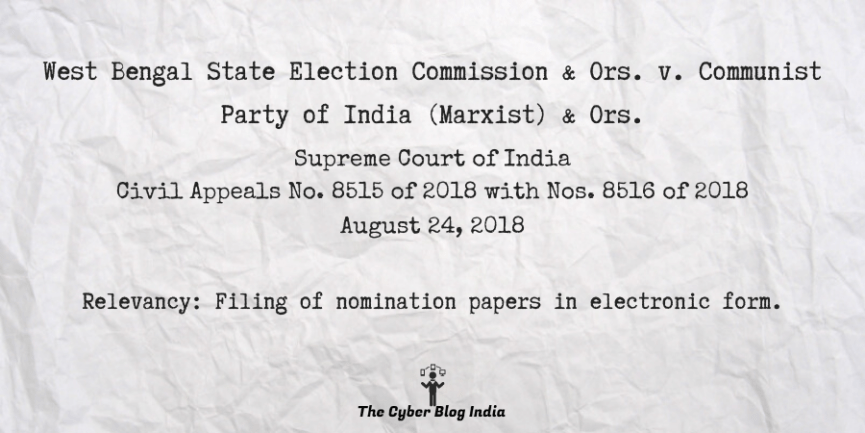West Bengal State Election Commission & Ors. v. Communist Party of India (Marxist) & Ors.

West Bengal State Election Commission & Ors. v. Communist Party of India (Marxist) & Ors.
(2018) 18 SCC 141
In the Supreme Court of India
CA 8515-8516/2018
Before Chief Justice Deepak Misra, Justice A.M. Khanwilkar, and Justice (Dr) D.Y. Chandrachud
Decided on August 24, 2018
Relevancy of the case: Filing of nomination papers in electronic form.
Statutes & Provisions Involved
- The Information Technology Act, 2000 (Section 6)
- The Constitution of India, 1950 (Article 32, 226, 227, 243K, 243O)
- The West Bengal Panchayat Elections Act, 2003 (Section 46-51)
- The West Bengal State Election Commission Act, 1994 (Section 3)
Relevant Facts of the Case
- The notification for holding panchayat elections was issued in the State of West Bengal.
- A PIL was filed before the High Court and a petition under Article 32 of the Constitution of India before the Supreme Court, praying for the acceptance of nomination papers through email. As the State Election Commission was competent to deal with the issue, parties were relegated to it.
- The State Election Commission extended the date for filing the nomination papers by one day which was recalled immediately. This was challenged before the High Court.
- A Division Bench of the Calcutta High Court issued directions to the State Election Commission to accept nominations submitted in the electronic form.
- In issuing these directions, the High Court was conscious of the fact that the provisions of the Information Technology Act, 2000 did not apply to the West Bengal State Election Commission, which is a constitutional authority. Nonetheless, the High Court held that the provisions of the Information Technology Act, 2000 shall be deemed to be read into the provisions of the West Bengal Elections Act, 2003.
- Holding that such a construction would further the democratic process and facilitate a fair and free election, the High Court issued directions for the acceptance of nominations in the electronic form. The judgment of the High Court has been challenged in these proceedings by the West Bengal State Election Commission.
Prominent Arguments by the Advocates
Advocate on behalf of the State Election Commission:
- The directions issued by the High Court, after the last date of nominations and scrutiny, to accept nominations submitted electronically is contrary to the clear mandate of Section 46(1) of the West Bengal Panchayat Elections Act, 2003.
Advocate on behalf of the first respondent:
- The High Court had been constrained to issue a direction for the acceptance of nominations in the electronic form after sufficient material was placed before it indicating that candidates had been prevented from filing their nominations. It was urged that as a result of the violent activities of the supporters of the ruling party in the State, a situation had arisen where it was not possible to file nominations personally and hence the directions which were issued by the High Court subserve the cause of a free and fair election.
Opinion of the Bench
Justice Dr D.Y. Chandrachud:
- The State Election Commission has been established pursuant to the constitutional dispensation under the provisions of Section 3 of the West Bengal State Election Commission Act, 1994. The High Court was cognizant of the fact that the State Election Commission does not fall within the ambit of Section 6(1)(a) of the Information Technology Act, 2000.
- It does not strictly come within the ambit of Section 6(1)(a) of the Act to be a body or agency owned or controlled by the appropriate Government.
- Similarly, the State Government is not called upon to make rules in terms of Section 90 of the Information Technology Act, 2000 in respect of filing of nomination forms through e-mail.
- Sub-sections (1) and (2) of Section 46 of the West Bengal Panchayat Elections Act, 2003 require that nominations have to be delivered in person by the candidate or through the proposer.
- The provisions contained in the West Bengal Panchayat Elections Act, 2003 and Rules constitute a complete code in regard to the conduct of the election, including the matter of filing of nominations. Neither the Act nor the Rules contemplate the filing of nominations in the electronic form. Any reform of the electoral process to permit the filing of nominations electronically would have to be carried out by a legislative amendment.
- Moreover, the election process had already been initiated. The last date for the filing of nominations was over.
Final Decision
- The High Court was in error in issuing directions for the acceptance of nominations in the electronic form.
- The judgment of the High Court would accordingly have to be set aside.
